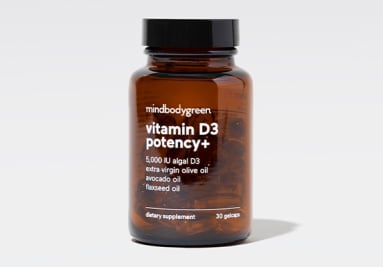
Image by Valentina Barreto / Stocksy
October 22, 2022
Many factors influence vitamin D status—including biological sex: According to a 2018 study from the British Journal of Nutrition, while ratios of healthy and insufficient vitamin D levels were relatively similar between females and males, women are 11% more likely to be deficient in vitamin D.
Why is this? Unfortunately, the answer isn’t crystal clear. You see, the factors that determine a person’s vitamin D status aren’t so cut and dried. Vitamin D levels are affected by a multitude of variables in addition to sex—including age, adiposity, skin tone, and genetics, not to mention the many aspects that impact sun exposure, like season, latitude, and time spent outdoors with skin exposed.
Advertisement
This ad is displayed using third party content and we do not control its accessibility features.
What we do know is that vitamin D supports…well, pretty much every facet of our physical and mental well-being. Beyond impressive health benefits that support us regardless of our biological sex (like gut health, immune function, mood, and a healthy inflammatory response), there are quite a few reasons women would be particularly interested in achieving sufficient vitamin D levels.*
How vitamin D impacts women’s health.
While this is important for both sexes throughout life, women that are pregnant or postmenopausal are especially prone to fluctuating calcium levels (due to fetal demands and hormonal changes, respectively), which can lead to suboptimal bone metabolism2 and muscle mass. That’s why sustaining vitamin D sufficiency is critical for women to maintain optimal muscle and bone health—at all ages, but especially during their reproductive and postmenopausal years.
Speaking of hormones, vitamin D has a massive influence on the endocrine system—in a good way! While hormones are by no means a female-specific area of health, women are no strangers to fluctuations that impact their menstrual cycles, sex lives, and mental well-being.
Thankfully, maintaining optimal vitamin D status helps promote overall hormone balance for women, and is associated with:*
Advertisement
This ad is displayed using third party content and we do not control its accessibility features.
If you haven’t started shopping for a high-quality vitamin D supplement after reading that last one…what the hell are you waiting for, girl?! Check out mbg’s top picks here.
How to achieve & maintain vitamin D sufficiency.
So, you’ve established that you want to support your bone health, muscle strength, sex life, and more by achieving vitamin D sufficiency. What’s the next step?
First, consider testing your vitamin D levels using a serum total 25(OH)D test. You can talk to your health care provider about ordering a lab test or test your levels yourself (well, collect the sample at home and ship it off for testing) with one of these at-home vitamin D tests.
Once you get your results, see which range you land in:
- Under 20 ng/ml is clinically deficient
- 21-30 ng/ml is clinically insufficient
- 31-49 ng/ml is considered “normal,” but still leaves room for improvement
- Above 50 ng/ml is the truly optimal range to aim for for whole-body health and well-being
Advertisement
This ad is displayed using third party content and we do not control its accessibility features.
Here are the facts: According to the British Journal of Nutrition study quoted above, 29% of U.S. adults are clinically deficient in vitamin D and another 41% are clinically insufficient. What’s more, diet and sunlight are rarely enough to help you achieve and sustain vitamin D sufficiency.
With this in mind, most Americans would be wise to utilize vitamin D supplementation to help optimize their D status (especially women!). A quality vitamin D supplement with an efficacious dosage (i.e., 5,000 IU) of vitamin D3 can help you reach levels above 50 ng/ml, so your endocrine, musculoskeletal, and whole-body health can thrive.*
mindbodygreen’s vitamin D3 potency+ delivers 5,000 IU of sustainable algal D3 with an organic trio of oils (avocado, flaxseed, and olive) for optimized bioavailability and absorption.* No matter what your D status looks like now, mbg’s formula can help you reach and sustain healthy levels to promote whole-body health.*
The takeaway.
Women are 11% more likely to have vitamin D levels in the deficient range. Suboptimal D status can lead to implications for musculoskeletal and endocrine health (to mention a few), but taking a high-quality, daily vitamin D supplement can help women achieve vitamin D sufficiency and optimize their well-being.*
If you’re looking for a premium daily D3 supplement that will promote healthy D status and optimize women’s health, consider mbg’s vitamin D3 potency+.*
If you are pregnant, breastfeeding, or taking medications, consult with your doctor before starting a supplement routine. It is always optimal to consult with a health care provider when considering what supplements are right for you.


